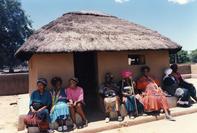Pedi Heartland
Subsequent to their defeat at the hands of the British, the Pedi were relegated to a series of officially designated reserves. Foremost among these was the Pedi heartland, Sekhukhuneland. Together with the adjoining reserves, Sekhukhuneland was incorporated into Lebowa in the 1960s, designated as a homeland for the Northern Sotho people.

Population increase and land degradation in these reserve areas have made it increasingly difficult to live from cultivation alone. Men have been compelled to leave home and work for wages. But there is still a keen commitment to the maintenance of fields, with ploughing done during periods of leave or, increasingly, by professional ploughmen.
The typical pattern has been for Pedi men to spend a short time working on nearby farms, and later to find a job on the mines or in domestic service, and then in industry. The management and execution of all other agricultural tasks have been entrusted to these men's wives.
Although subjected to spiralling controls in their lives as wage-labourers, Pedi men fiercely resisted all direct attempts to interfere with the 'home' economy - the sphere of cattle-keeping and agriculture. Families have continued to practise cultivation and to keep cattle, not so much to subsist but more as a way of showing their long-term commitment to the rural social system in order to gain security in retirement.
More recently, women have begun to work for wages as well. Some work only before marrying, for short periods on farms. Others, divorcing or remaining unmarried, have since the 1960s been working in domestic service in the towns of Gauteng.
Chieftainship
Despite their military defeat during the 19th century, the Pedi have continued to hold the chieftainship in high esteem. Especially in Sekhukhuneland, in which the former seat of the paramountcy Mohlaletse is situated, the Pedi have made concerted efforts to reconstruct the chiefship.
These exertions became most strenuous during the 1950s, when the apartheid government was attempting to use local chiefs as go-betweens in their 'Bantu Authorities' system of rule. Pedi resistance against Bantu authorities in the 1958 Sekhukhune revolt resulted in the deportation of Morwamobe, Sekhukhune's grandson and heir Migrants played a key role in carrying political ideas and organization strategies between town and countryside, and a number of ANC branches were founded during this era.
Although a number of Pedi have settled permanently in the towns of Gauteng, most continue to have an abiding commitment to Bopedi (the place of the Pedi) in the countryside. Chiefs and commoners have witnessed the dismantling of the apartheid government's Lebowa and its subsuming within the new South Africa's Northern Province.